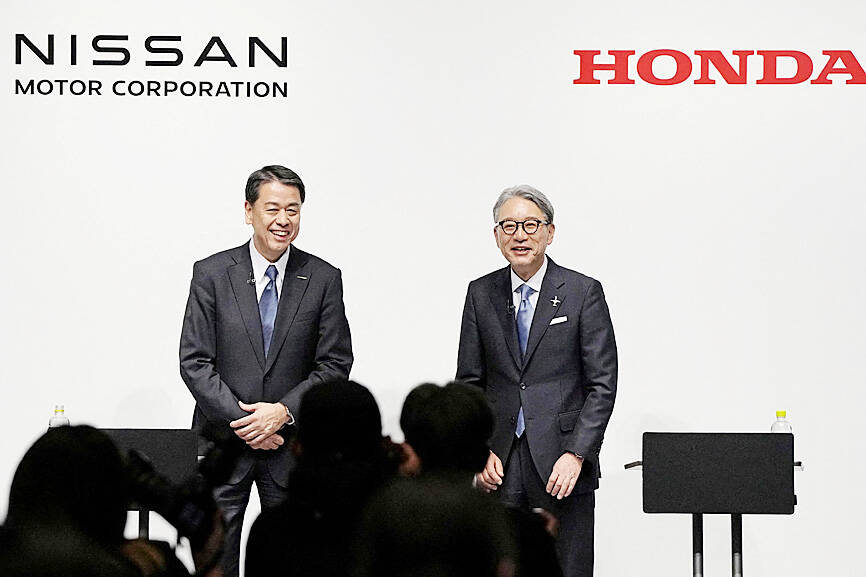Honda Motor Co absorbing Nissan Motor Co could give the two struggling Japanese brands the scale they need to take on China’s BYD Co (比亞迪), sales figures released yesterday showed.
Honda, which earlier this week sketched out plans for a deal that amounts to an acquisition of Nissan, sold 3.43 million cars globally in the first 11 months of this year. Nissan said it sold just over 3 million.
China’s biggest automaker BYD sold 3.76 million vehicles over the same period — a clear illustration of how Nissan and Honda are weak alone, but together might have a fighting chance.

Photo: Kyodo via Reuters
Honda and Nissan are having trouble contending with ascendant domestic automakers in China, which surpassed Japan as the world’s largest car exporter last year and is set to pull further ahead next year.
The duo have had to pare back staffing and production in China, while Mitsubishi Motors Corp, which might also participate in the Honda-Nissan combination, has all but pulled out of the world’s biggest car market.
Honda’s sales in China fell 28 percent last month compared with the same month of last year, while output slumped 38 percent year-on-year.
Any spending Honda might need to do to catch up could be impacted by its ¥1.1 trillion (US$7 billion) buyback, S&P Global Inc said in a report.
“Large-scale share repurchases do not contribute to strengthening the future business base and result in capital outflows,” the ratings agency added.
Honda announced the buyback on Monday. The upper limit amounts to 24 percent of issued shares. Stock in Honda closed up 0.8 percent yesterday.
Nissan’s China sales dropped 15.1 percent last month, while local production sank 26 percent.
Globally, Honda’s sales last month slipped 6.7 percent to 324,504 units, while output tumbled 20.4 percent. Nissan’s worldwide sales declined 1.3 percent year-on-year last month to 278,763 vehicles, while production took a bigger hit at 14.3 percent.
Together, Honda and Nissan would also pose more of a threat to Toyota Motor Corp, which is the world’s biggest automaker followed by Germany’s Volkswagen AG. Its global sales plateaued last month as lackluster demand coalesced with a pause in production at two of its plants.
Toyota’s sales — including that of subsidiaries Daihatsu Motor Co and Hino Motors Ltd — totaled 984,348 units last month, the Japanese automaker said yesterday, down 0.2 percent year-on-year. Production declined 9.4 percent to 966,921 units.
Toyota’s business is also feeling the strain of locally made electric vehicles in China as well as intense competition over hybrid gasoline-electric cars in the US.
Like Honda and Nissan, its hold on markets across Southeast Asia is being steadily eroded by Chinese competitors, too.
More broadly, weaker global demand this year for new cars was compounded by output cuts at Toyota caused by regulatory probes, and recalls in Japan and abroad.
Production in the first 11 months fell 7.3 percent in Japan and 15.2 percent in China for Toyota, again underscoring the rising competition in Asia’s biggest economy.
Toyota’s production in China, or vehicles off the delivery line as opposed to end-consumer sales, declined 1.6 percent last month.
Shares in Toyota gained as much as 4.4 percent yesterday.

SEEKING CLARITY: Washington should not adopt measures that create uncertainties for ‘existing semiconductor investments,’ TSMC said referring to its US$165 billion in the US Taiwan Semiconductor Manufacturing Co (TSMC, 台積電) told the US that any future tariffs on Taiwanese semiconductors could reduce demand for chips and derail its pledge to increase its investment in Arizona. “New import restrictions could jeopardize current US leadership in the competitive technology industry and create uncertainties for many committed semiconductor capital projects in the US, including TSMC Arizona’s significant investment plan in Phoenix,” the chipmaker wrote in a letter to the US Department of Commerce. TSMC issued the warning in response to a solicitation for comments by the department on a possible tariff on semiconductor imports by US President Donald Trump’s

The government has launched a three-pronged strategy to attract local and international talent, aiming to position Taiwan as a new global hub following Nvidia Corp’s announcement that it has chosen Taipei as the site of its Taiwan headquarters. Nvidia cofounder and CEO Jensen Huang (黃仁勳) on Monday last week announced during his keynote speech at the Computex trade show in Taipei that the Nvidia Constellation, the company’s planned Taiwan headquarters, would be located in the Beitou-Shilin Technology Park (北投士林科技園區) in Taipei. Huang’s decision to establish a base in Taiwan is “primarily due to Taiwan’s talent pool and its strength in the semiconductor

An earnings report from semiconductor giant and artificial intelligence (AI) bellwether Nvidia Corp takes center stage for Wall Street this week, as stocks hit a speed bump of worries over US federal deficits driving up Treasury yields. US equities pulled back last week after a torrid rally, as investors turned their attention to tax and spending legislation poised to swell the US government’s US$36 trillion in debt. Long-dated US Treasury yields rose amid the fiscal worries, with the 30-year yield topping 5 percent and hitting its highest level since late 2023. Stocks were dealt another blow on Friday when US President Donald

UNCERTAINTY: Investors remain worried that trade negotiations with Washington could go poorly, given Trump’s inconsistency on tariffs in his second term, experts said The consumer confidence index this month fell for a ninth consecutive month to its lowest level in 13 months, as global trade uncertainties and tariff risks cloud Taiwan’s economic outlook, a survey released yesterday by National Central University found. The biggest decline came from the timing for stock investments, which plunged 11.82 points to 26.82, underscoring bleak investor confidence, it said. “Although the TAIEX reclaimed the 21,000-point mark after the US and China agreed to bury the hatchet for 90 days, investors remain worried that the situation would turn sour later,” said Dachrahn Wu (吳大任), director of the university’s Research Center for